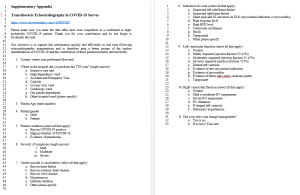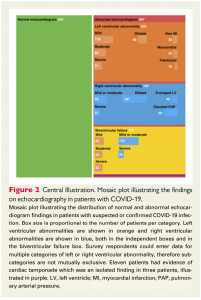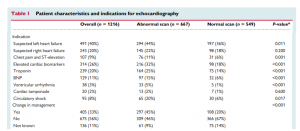A study by Marc Dweck at the University of Edinburgh reporting on heart scans of COVID-19 patients has caught the attention of various outlets today. According to the BBC’s Science Focus, “more than half of heart scans among hospitalized COVID-19 patients are abnormal, suggesting the coronavirus may have a devastating impact on this vital organ”.
The researchers, comprising a network of cardiologists, asked clinicians who conducted echocardiograms on 1,216 patients either testing positive for COVID-19 (73%) or judged as most likely having the virus (27%) to immediately fill out a survey on an app on their cell phones giving some background on the patient and the findings of the echocardiogram.
The study and the media write-ups tout that the data came from 69 different countries (I counted 68, although maybe they are counting “missing” as a country), although the UK provided a good chunk of the data (42%), with France, Italy, Spain, and the United States providing another good chunk of the data (30%).
As the BBC correctly reports, the clinicians reported for 55% of the echocardiograms that the patient had an “abnormal scan”.
The write-up is fairly reserved. The main point of the study is to show how pre-scan symptoms (“indications”) are related to the scan findings, to encourage doctors to think about using echocardiograms for COVID-19 patients showing these symptoms.
This may seem like a no-brainer to most of us, but the conclusion alludes to concerns that echocardiograms increase the risk of COVID-19 infection. Clearly doctors will need to weigh the potential benefits (clinicians reporting abnormal scans were 46 percentage points more likely to report that there was a change in the course of treatment due to the scan) against the risk that the scan will spread the virus.
For that very narrow motivation, one cannot fault the study too much, especially since it is taking place during a pandemic. Doing a comparison to non-COVID-19 patients would have been nice (they did show that the chances of having an abnormal scan were larger with clinician-reported symptom severity, and that is also higher for patients with confirmed cases of COVID-19 as opposed to probable cases), but very impractical in this context (especially since echocardiograms are feared to increase the risk of COVID-19 infection) and showing the effects of COVID-19 is not really the point of the study. Another concern is that since clinicians are doing survey reports of their findings from the echocardiograms, clinicians’ diagnostic standards might not be consistent across all settings (remember this study is drawing on survey data from clinicians in 68 or 69 countries). The fact that the clinicians know the subjects’ COVID-19 status and severity might bias their findings towards finding abnormalities, but again I think you can cut the researchers some slack because they are doing this in a pandemic.
Having said that, I think the authors and/or their supporting institution (the British Heart Foundation funded the study, and put out a press release about it) should be criticized for publicizing the findings. It is inevitable that most readers will view news reports as indicating that the study supports the notion that COVID-19 affects the heart. Take Science Focus’s headline: “Coronavirus may have a ‘devastating impact’ on the heart”. The headlines of Sky News (“Heart scans of more than half of COVID-19 patients abnormal”) and Newsweek (“Scans reveal heart damage in over half of COVID-19 patients in study”) are a bit more circumspect but I think even these will invite readers’ inferences that this study shows that COVID-19 affects the heart. In reality, as the study acknowledges in its conclusion, its methods cannot speak at all to the effect of COVID-19 on heart disease. First, most obviously, not all COVID-19 patients are hospitalized. Second, even among those who are hospitalized, clinicians will only consider an echocardiogram for those with symptoms of heart disease. These outlets also had similar caveats buried deep in their pieces, but they do not really convey how the findings are totally orthogonal to the issue of how serious COVID-19 affects hearts.
This study may or may not help doctors’ decision-making for ordering echocardiograms for COVID-19 patients. I do not see the relevance of it for the general public, and when the BHF and/or the authors reached out to media outlets promising this was a study worthy of their attention, they guaranteed that lay readers would read more into the study than they should.




